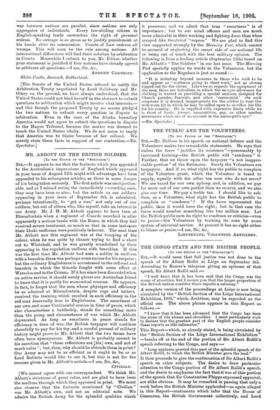[To TEE EDITOR OF THE "SPECTATOR. "] SIR, — It appears to me
that the footnote which you appended to the Australian's impressions of England which appeared in your issue of August 12th might with advantage have been appended to his subsequent articles, as there is some danger of his being taken seriously. The first article was unobjection- able, and as I missed seeing the immediately succeeding ones, they may have been so also ; but the article on our soldiers appearing in your issue of September 9th is calculated, perhaps intentionally, to " get a rise," not only out of our soldiers, but out of others who, like myself, take an interest in our Army. Mr. J. H. M. Abbott appears to have been at Bloemfontein when a regiment of Guards marched in after apparently a serious tussle with the Boers, in which they had received severe treatment, so much so that in some instances their khaki uniforms were positively indecent. The next time Mr. Abbott saw this regiment was at the trooping of the colour, when he was quite by chance trying to find a short cut to Whitehall, and he was greatly scandalised by their appearing in the regulation uniform with bearskins. If this was the first time Mr. Abbott had seen a soldier in uniform with a bearskin there was perhaps some excuse for his surprise ; but the ordinary Englishman is accustomed to the red coat and bearskin in which the Guards fought with some effect at Waterloo and in the Crimea. If it has since been discarded when on active service, it should surely please our Australian friend to know that it is partly for economical reasons. He appears, in fact, to forget that the men whose physique and efficiency he so admired at Bloemfontein, despite rags and tatters, received the training which resulted in such efficiency in the red coat deservedly dear to Englishmen. The smartness of our own and some Continental armies in time of peace, which also characterises a battleship, stands for something more than the pomp and circumstance of war which Mr. Abbott deprecated. As long as smartness in peace stands for efficiency in time of war, the British taxpayer will continue cheerfully to pay for his toy, and a careful perusal of military history might prove to Mr. Abbott that the two terms have often been synonymous. Mr. Abbott is probably correct in his assertion that " these reflections are [his] own, and not of much value " ; but, then, why should he obtrude them in print ? Our Army may not be as efficient as it ought to be, or as Lord Roberts would like to see it, but this is not for the reasons given in Mr. Abbott's article.—I am, Sir, &c.,
CIVILIAN.
[We cannot agree with our correspondent. We think Mr. Abbott's strictures of great value, and are glad to have been the medium through which they appeared in print. We must also observe that the footnote mentioned by " Civilian " was Mr. Abbott's own, and not an editorial note. We admire the British Army for the splendid qualities which it possesses, and we admit that true " smartness " is of importance ; but to our mind officers and men are much more admirable in their working and fighting dress than when arrayed like theatrical "supers." We are glad to find this view supported strongly by the Morning Post, which cannot be accused of neglecting the smart side of our national life or being out of touch with the best military opinion: The following is from a leading article (September 13th) based on Mr. Abbott's " The Soldiers " in our last issue. The Morning Post specially applies its words to the Volunteers, but the application to the Regulars is just as sound :-
"It is irritating beyond measure to those who wish to be and appear as workmen going to their work,' not as clowns rigged out for the circus. Likewise as regards the equipment of the men, there are battalions in which the meagre allowance for clothing is wasted in providing a special uniform designed for Church parades, funerals, and other ceremonial.' On such occasions it is deemed inappropriate for the soldier to wear the well-worn kit in which he may be called upon to sacrifice his lifo for his country. He is supplied with expensive finery while he is short of boots, jerseys, ammunition, pay, or other sombre necessaries which are of no account in the nurse-girl's eye."
—ED. Spectator.]










































 Previous page
Previous page